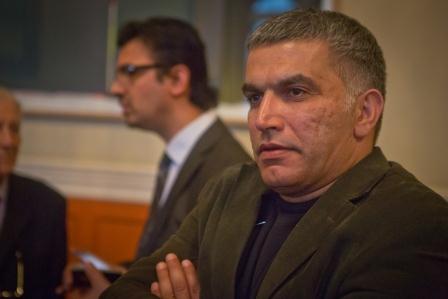[vc_row][vc_column][vc_column_text]

Bahraini human rights defender Nabeel Rajab (Photo: The Bahrain Institute for Rights and Democracy)
The United Nations (UN) Working Group on Arbitrary Detention has issued a formal decision declaring Bahrain’s imprisonment of human rights defender Nabeel Rajab unlawful. Rajab – who was arrested on 13 June 2016 and later sentenced to a total of seven years in prison for tweets and media appearances – is arbitrarily detained under eight articles of the Universal Declaration of Human Rights and seven articles of the International Covenant on Civil and Political Rights, according to the Working Group. It finds that Rajab should never have been prosecuted and that Bahraini authorities employed “vague and overly broad” legal provisions to target him for his “political views and convictions.” His detention, therefore, constitutes two different categories of arbitrary detention under the Working Group’s mandate, in that it contravenes his rights to freedom of opinion and expression, and it discriminates against him as a human rights defender.
“Our friend Nabeel has been in detention for more than two years,” said Index on Censorship chief executive Jodie Ginsberg. “Bahrain should release him immediately and pay compensation as urged by the UN Working Group on Arbitrary Detention. We hope that these findings will also encourage the UK government to do more to encourage its ally Bahrain to uphold its international human rights obligations.”
Bahrain is urged to immediately and unconditionally release Rajab — a 2012 Index on Censorship Freedom of Expression Award winner — from custody and “accord him an enforceable right to compensation and other reparations.” Moreover, the Working Group concludes that Bahrain’s consistent pattern of arbitrary detention against human rights defenders, activists, religious leaders, and other civil society actors may be approaching crimes against humanity.
Please find the Working Group’s key observations below:
· “Mr. Rajab has been arrested, detained, prosecuted and imprisoned for allegedly spreading false news abroad which damages the national interest and for allegedly spreading false rumours in wartime, insulting governing authorities and insulting a foreign country — pursuant to articles 133, 134, 215 and 216 of the Penal Code. . . these provisions of the Penal Code are so vague and overly broad that they could, as in the present case, result in penalties being imposed on individuals who had merely exercised their rights under international law.”
· “Given its finding that the deprivation of liberty of Mr. Rajab is arbitrary under category II … no such trial of Mr. Rajab should have taken place or take place in the future.”
· “The Working Group cannot help but notice that Mr. Rajab’s political views and convictions are clearly at the centre of the present case and that the authorities have displayed an attitude towards him that can only be characterised as discriminatory; indeed, he has been the target of persecution, including deprivation of liberty, for many years and there is no other explanation for this except that he is exercising his right to express such views and convictions.”
· “The deprivation of liberty of Nabeel Ahmed Abdulrasool Rajab, being in contravention of … the Universal Declaration of Human Rights and … the International Covenant on Civil and Political Rights, is arbitrary.”
· “The Working Group considers that … the appropriate remedy would be to release Mr. Rajab immediately and accord him an enforceable right to compensation and other reparations, in accordance with international law.”
· “The present case is one of several brought before the Working Group in the past five years concerning the arbitrary deprivation of liberty of persons in Bahrain . . . under certain circumstances, widespread or systematic imprisonment or other severe deprivation of liberty in violation of the rules of international law may constitute crimes against humanity.”
Commenting, Husain Abdulla, Executive Director of Americans for Democracy & Human Rights in Bahrain (ADHRB): “This is a landmark decision that clearly indicts Bahrain’s systematic and widespread arbitrary detention of activists like Nabeel Rajab for exercising their right to free expression. The Bahraini government must immediately heed the UN’s call to release Rajab and compensate him for the last two years he’s spent illegally languishing in prison. As the UN’s findings rightly suggest, this is not just a crime against a brave human rights defender, but part of Bahrain’s wider crimes against humanity.”
Sayed Ahmed Alwadaei, Director of Advocacy for the Bahrain Institute for Rights and Democracy (BIRD): “The UN has now unequivocally found that Bahrain is arbitrarily detaining Nabeel Rajab in violation of numerous international legal standards – these vital findings cannot be ignored. It is now incumbent on Bahrain’s allies like the United Kingdom, which has so far failed to address Rajab’s case, to publicly back the UN’s demands for his unconditional release. Anything short of that is a tacit endorsement Bahrain’s patently criminal behaviour.”
[/vc_column_text][/vc_column][/vc_row][vc_row][vc_column][vc_basic_grid post_type=”post” max_items=”4″ element_width=”6″ grid_id=”vc_gid:1534420203761-b82a3b89-1c77-7″ taxonomies=”3368″][/vc_column][/vc_row]






